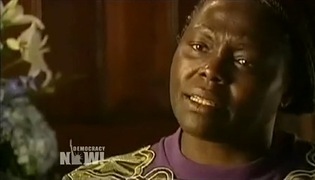
Guests
- Dekha Ibrahim AbdiKenyan peace activist.
We speak with two Right Livelihood laureates, Mohammad Hasnain of the Ladakh Ecological Development Group of India, which won the award for “preserving the traditional culture and values of Ladakh against the onslaught of tourism and development,” and Dekha Ibrahim Abdi of Kenya, who won for “showing in diverse ethnic and cultural situations how religious and other differences can be reconciled, even after violent conflict, and knitted together through a cooperative process that leads to peace and development.” [includes rush transcript]
Transcript
AMY GOODMAN: We are broadcasting from Bonn, Germany. I’m Amy Goodman, host of Democracy Now! This week is a gathering of more than eighty laureates of the Right Livelihood Awards. Last night was the opening dinner, and Democracy Now! talked to a few of those award winners.
MOHAMMAD HASNAIN: My name is Mohammad Hasnain. I’m from this place called Ladakh in India. It’s in the Trans-Himalayas on the border of Tibet. It’s often called the Little Tibet, because we have a lot of, yeah, Tibetan culture in there. So I’m with this organization called Ladakh Ecological Development Group that started in the early '80s, and we got a Right Livelihood Award in 1986.
I mean, like, people who don't think that climate change is for real, I mean, we are actually a cold desert. I mean, and it’s one of the driest places on earth. Annual precipitation is around ten centimeters, like that includes rain and snow. And yet, like exactly a month back, we had the worst natural disaster that ever — that was ever recorded in Ladakh. We had flash floods across the region, and like 600 people have died in that floods. I mean, in a small region, that’s a huge number. And like massive flash — cloudbursts, which we had never heard about before, flash floods, landslides. Villages have been, like, destroyed en masse. I mean, lots of agriculture land destroyed. Thousands of houses destroyed. And 600 people dead, and out of like a population of one, like, plus — I mean, a hundred thousand-plus. I mean, a place like Ladakh that hardly contributes in what leads to climate change is on the — is on the front of receiving the brunt of climate change. That’s kind of sad, that — I mean, you know, for things that other people do in other parts of the world, we bear the consequences.
DEKHA IBRAHIM ABDI: My name is Dekha Ibrahim Abdi. I am from the Northeast province of Kenya, from Wajir district. I now live and work in Mombasa, from Mombasa, in the coast — in the port city of Mombasa in Kenya. And I’m here as a laureate, and I got the Right Livelihood Award. I was a recipient in 2007. And my work entails, at the community level, as a trustee for Wajir Peace University Trust, and we are trying to establish now a peace university, but we are starting with a peace center. But many years ago, 1993, we started a peace movement, following the inter-community clashes that started in the northeast of Kenya but spread in the border areas. And much of our work was to start sort of a way in which state and non-state actors can collaborate and build peace together — people from differences, either clan differences, political differences, religious differences, but trying to find ways in which people can share public assets, can share the public space, can work together, but looking at diversity not as a problem, but as a strength.
In terms of the issues of dealing with groups that are not peaceful in the world, to engage with them in dialogue is the best way. To transform them is the best way. But if you sort of label them and call them terrorists and call them bad people, that is like an end. For me, to engage in dialogue with all groups around the world, especially with Muslim groups, who are now seen as the bad in the world, we are not. Every society has a bad element. And to engage in dialogue — I engage in dialogue with the armed groups in Somalia, along the Kenyan border, because we have a symbiotic relationship. And I have a transformative thinking that, yes, you can change an individual. So I would like to appeal to President Obama to rethink sometimes the policies of engaging with armed groups, yeah, in order for him to have a very — a change and transformative experience for them, and not to — the label can be like the end, but the label should be changed so that they can find another avenue of trying to redeem themselves, to change themselves, to transform themselves.
AMY GOODMAN: Just some of the Right Livelihood Award laureates who have gathered here in Bonn, Germany. More than eighty of the close to 140 of them have gathered for the thirtieth anniversary of the Right Livelihood Awards, and there will be sessions happening all this week, talking about the many issues that these laureates have taken on, from climate change to human rights issues to sustainability and the environment.












Media Options